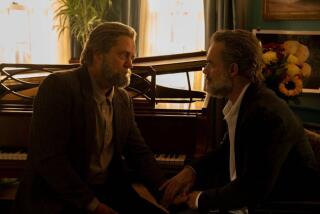The Unreal World: Brain injury is depicted in ‘The Descendants’
- Share via
“The Descendants”
Ad Hominem Enterprises
U.S. release: Nov. 18
The premise
Elizabeth King (Patricia Hastie) is in a water skiiing accident off Waikiki Beach. She suffers severe head trauma, falls into a deep coma and is maintained on life support for more than three weeks. Her husband, Hawaiian land baron Matthew King (George Clooney), must now assume full care of their two daughters while coping with the news that his wife had been having an affair and was preparing to leave him. Elizabeth’s physician, Dr. Johnston (Milt Kogan), soon tells Matt that there is no hope of recovery. His wife has no measurable upper or lower brain function: She has no eye movements and no brainstem reflexes and her pupils don’t respond to light. The doctor tells Matt that he has no legal choice but to follow her living will, which indicates that no extraordinary measures be performed if her condition is terminal. After bringing Elizabeth’s family and friends together to say their goodbyes, Matt has the breathing tube removed, and over the next few days Elizabeth nears death.
Medical questions
How can a spouse continue to function and deal with family responsibilities when faced with loss and betrayal at the same time? Is it believable that a patient with severe head trauma resulting in no measurable brain function could continue to breathe on her own for days after the respirator is removed? Could such a patient ever recover? Is a spouse compelled to follow a living will in such a situation?
The reality
“People do what they have to do to survive,” says Dr. Timothy Quill, palliative care expert and professor of medicine and psychiatry at the University of Rochester School of Medicine. It is believable that Matt would keep going for his children and for himself, as the movie shows, Quill adds.
Decision-making is difficult under emotional duress in this setting, says Dr. Bruce H. Dobkin, professor of neurology and director of the neurologic rehabilitation and research program at UCLA, but at least one family member usually rises to the occasion to be able to focus on weighing choices. The initial shock of the situation may keep people from fully grieving, and the parade of obligations and responsibilities may actually divert them from their deep emotions until weeks after a person has died.
It is believable that a patient like Elizabeth could continue to breathe on her own, says Dr. Thomas Carmichael, professor of neurology and vice chairman for research in the department of neurology at UCLA. Although loss of consciousness and brainstem reflexes indicate severe and diffuse damage to higher and lower brain centers, some spontaneous breathing can still occur for hours or even days after the ventilator is disconnected. The reason that patients like Elizabeth may keep breathing without ventilator support is due to the fact that the breathing centers are still partly functioning, Carmichael says.
A CT or MRI scan showing the extent of bleeding and brain damage would help predict the chances of any recovery, Dobkin says. But If there is loss of consciousness and no brainstem reflexes after an acute brain injury, meaningful functional recovery is not possible.
When essential brain centers are this badly damaged, Carmichael says, the condition is far worse than even a vegetative state in which upper brain centers are severely damaged but lower centers, including brainstem reflexes, are preserved enough for survival.
A spouse is generally required to follow the content and spirit of the living will, Quill says, especially when the living will is clear on what to do.
Siegel is an associate professor of medicine at New York University Langone Medical Center. His latest book is “The Inner Pulse: Unlocking the Secret Code of Sickness and Health.”
More to Read
The biggest entertainment stories
Get our big stories about Hollywood, film, television, music, arts, culture and more right in your inbox as soon as they publish.
You may occasionally receive promotional content from the Los Angeles Times.










